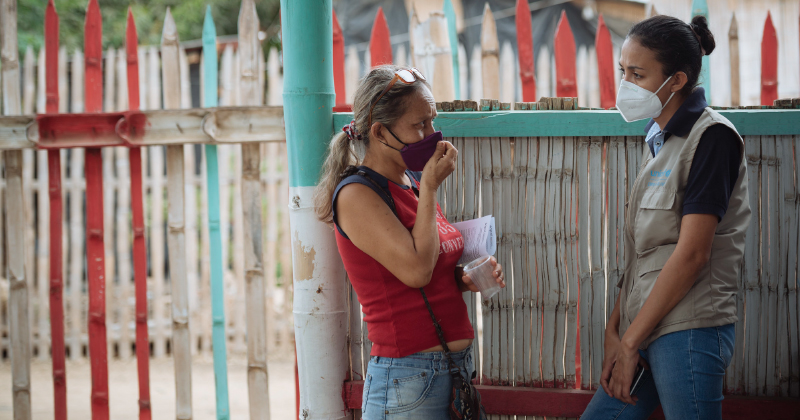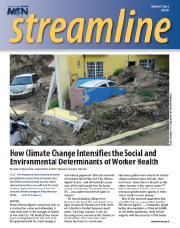
The current climate crisis presents unprecedented economic, social, and health impacts. For over three decades, international organizations and agencies have published reports that project more extreme weather events such as droughts, hurricanes, rains, forest fires, and more frequent and intense heat waves throughout the world.1 These projections have become more drastic with recent events such as Hurricanes Irma and María in 2017 and forest fires in the Amazon and regions of Africa. However, these events may affect populations in different ways depending on factors like income and education. Agricultural workers are subject to various environmental stressors during their workdays. This population not only experiences greater risks than workers in most other industries, but also has sociodemographic characteristics that place them in a vulnerable position regarding the effects that climate change may have on their workspace. These variables are added to other intrinsic psychosocial factors of the agricultural community such as labor and social conditions. In addition to the physical effects that extreme events can have on the physical health of the agricultural workers, the damages and social effects of disasters caused by the climate crisis can greatly deteriorate the mental health of this community. The assessment of the impact of climate change on the mental health of farmers and agricultural workers is especially important for those regions with a higher risk of intense natural disasters due to climate change.
Puerto Rico has faced extreme weather events yearly for the past nine years, including the loss of shoreline in most of its municipalities, droughts, and flooding, and, more recently, two major hurricanes (Irma and María in 2017). In addition to property loss, health deterioration, and deaths, María had a substantial impact on the agricultural sector, causing damage to 80% of the crops and up to $200 million in losses.2 Effects of the climate crisis, such as flooding, drought, and storms, are expected to continue to affect Puerto Rico. Moreover, the compounded emergencies like the earthquakes that occurred in the southwest of the Island in early 2020 and the current COVID-19 pandemic may worsen the situation. Recent studies present the perception of agricultural workers in Puerto Rico regarding climate change, exploring the preparedness and adaptation methods of agricultural workers and farmers. Results illustrate that 72.8% of agricultural workers think that climate change will continue to affect Puerto Rico, 66.3% identify their farms as “vulnerable,” 65.6% think that they are going to be negatively affected by climate change, and 58.8% report that climate change will continue to present a challenge to the agricultural sector in Puerto Rico.3 Moreover, reports show that Puerto Ricans’ mental health continues to deteriorate; the Island is the third jurisdiction in the US with the highest incidence of mental health conditions.4 Some reports identify that being subjected to trauma like evacuation, housing damage, or a relative’s death and/or injuries may have worsened the mental health state on the Island.5 In addition, vulnerable populations report facing additional stressors such as food and water limitations, and family migrating from the US territory.6
The effect of stressors caused by climate-related disasters on the agricultural worker population in Puerto Rico has not been explored. One of the primary challenges to effectively assess the current mental health and resilience of agricultural workers in Puerto Rico and its relation to climate change and disasters has been the lack of appropriate tools to conduct the assessment. Migrant Clinicians Network is conducting a pilot research project in collaboration with the Southeastern Coastal Center for Agricultural Health and Safety with the long-term goals of improving our understanding of agricultural workers’ mental health in Puerto Rico and its relationship to disasters and climate change, and exploring culturally appropriate research methods for use in Puerto Rico. To start, tools that were presently available were evaluated. Nine surveys or questionnaires that covered the topics of climate, mental health, and agricultural health were identified. Each of the nine surveys covered two of these topics and no tool was found that integrated all three. Most needed to be translated into Spanish and all needed to be adapted into local Puerto Rican Spanish. Eight interviews with agricultural workers were conducted in a rural area in Puerto Rico, to understand the scope of issues regarding the mental health of agricultural workers in Puerto Rico, and to evaluate some of the language included in those available tools. Staff also sought to identify unanticipated responses to closed-ended questions that may appear in the tool and to explore if the concepts covered were culturally appropriate for the area. The participants were agricultural workers in Castañer, Puerto Rico, a zone of high agricultural activity. During the interview, they were asked about the type of work they do at the farms, the years doing this work, and some demographic questions about themselves. Information provided by this group was consistent with data presented on previous reports regarding income and education.
Interview results presented a clear framework of the components that should be included in assessment tools that seek to understand the relationship between behavioral health and disasters. It became evident during the conversations that there were a few areas that needed to be included in assessment tools, like historical experience with climate-related disasters, the level of impact of those experiences, understanding of the current climate crisis, preparedness strategies that are being implemented in the area, and psychological distance from climate change.
However, during the interviews, staff noticed that interviewees had a disconnect between certain concepts used in the tool and what the workers’ understanding of the concept. For example, when using a tool that asked them about different concepts relating to climate change, interviewees used the terms “climate change” and “global warming” as synonyms for regular weather variation. Concepts related to mental health like stress, depression, and anxiety were also used interchangeably. These results are shaping the process of our adaptation to focus on language that participants understand to ensure reliable results.
Moving forward, MCN will build a preliminary tool using the results from the interviews and previous analysis of available tools. Questions will be adapted to match the educational levels of agricultural workers, and will take into consideration interview results and information available in sources and reports including, but not limited to, the Census of Agriculture, the 2010 Population Census, UDS patient data, and the American Community Survey. In the long term, MCN hopes that the tools that will be developed can be used to gather information to inform strategies to improve agricultural workers’ capacity to manage and overcome disasters. Understanding the mental health of agricultural workers and their relationship with climate change and resilience is essential to develop prevention strategies and appropriate public policy for the population, to ensure that when the next climate disaster strikes, this highly marginalized population in rural areas of Puerto Rico is better protected.
REFERENCES:
1 Pachauri, R. K., Allen, M. R., Barros, V. R., Broome, J., Cramer, W., Christ, R., ... & Dubash, N. K. (2014). Climate change 2014: synthesis report. Contribution of Working Groups I. II and III to the fifth assessment report of the Intergovernmental Panel on Climate Change, 151.
2 Rodriguez, L. & Niles, M. (2018) El impacto del huracán María en el sector agrícola puertorriqueño: Experiencias, retos y percepciones (Reporte). Servicio de Extensión Agrícola.
3 Ibid.
4 Departamento de Salud (2019) Estadísticas Preliminares de Casos de Suicidio Puerto Rico, Febrero 2018.
5 Ferré, I. M., Negrón, S., Shultz, J. M., Schwartz, S. J., Kossin, J. P., & Pantin, H. (2019). Hurricane Maria’s Impact on Punta Santiago, Puerto Rico: Community Needs and Mental Health Assessment Six Months Postimpact. Disaster medicine and public health preparedness, 13(1), 18-23.
6 Orengo-Aguayo, R., Stewart, R. W., de Arellano, M. A., Suárez-Kindy, J. L., & Young, J. (2019). Disaster exposure and mental health among Puerto Rican youths after Hurricane Maria. JAMA network open, 2(4), e192619-e192619.

Read this article in the Fall 2021 issue of Streamline here!
Sign up for our eNewsletter to receive bimonthly news from MCN, including announcements of the next Streamline.